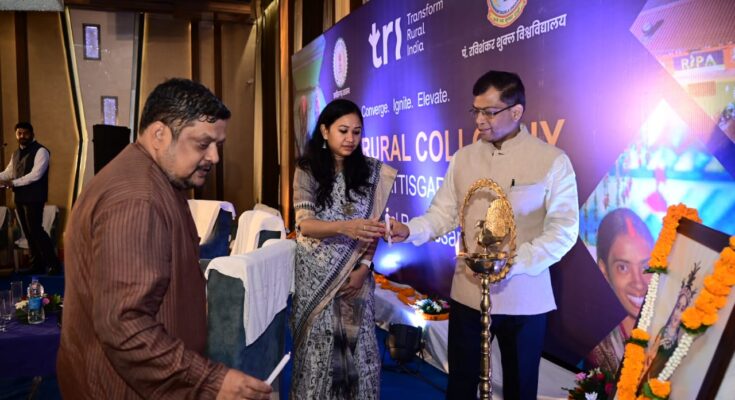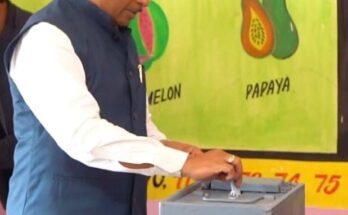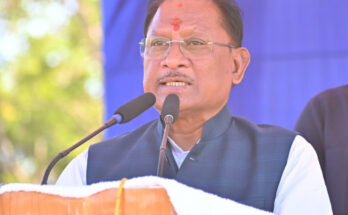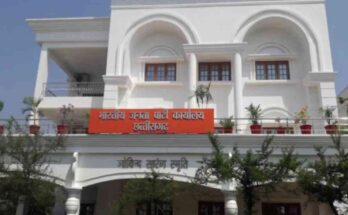Society’s approach to regenerative development discussed
Youth, people’s representatives, Bihan didis and families from remote areas talked about their lives, struggles, challenges and dreams
Raipur, 22 July 2023


Under the joint aegis of New Delhi-based social organization Transforming Rural India Foundation (TRIF) and Pandit Ravi Shankar Shukla University, ‘India Rural Colloqui’ was organized today at a private hotel in the capital. Here the major challenges of rural poverty and inequality in the country were discussed. During this, the role of society, government and market in the construction of new villages and the solutions to the challenges were discussed in detail. Senior officials of the state, social workers, entrepreneurs and various experts in the field of social development participated in the discussion and discussed solutions to rural poverty, inequality and other anomalies. On this occasion, a booklet based on the success of women under the Lakhpati Didi scheme was also released under the Bihaan scheme.

In the inaugural session, Vice Chairman of Chhattisgarh State Planning Commission Mr. Ajay Singh said that ‘India Rural Colloqui’ is being organized for the first time in Chhattisgarh at the regional level. With this, real and correct information will be available for planning at the national level. The information obtained from this on the basis of local thinking and challenges will prove useful in the formulation of plans. He said that India has emerged as the 5th largest economy in its journey of 75 years.

According to the RBI report, by the time India completes 100 years of independence, it will come under the category of developed countries. These estimates are encouraging, but for development and its pace, it is also necessary to understand that development will have no meaning unless its benefits reach every citizen. We will become a developed country only when every citizen participates in it. Vice President Shri Singh said that poverty and inequality are big challenges in the country. Poverty is now measured on the basis of Multidimensional Poverty Index, which includes economic, education, health and other living standards. According to the latest figures, 13 crore people of the country have come out of the poverty line. This is a big figure but more important is how far above the poverty line these people have reached.
Shri Ajay Singh said that India is a big market due to population. If society, government and market follow the right strategy in the country, then it will definitely become a developed nation by 2047. For this, a policy will have to be made on the basis of the local situation, development and challenges of each state. Chhattisgarh is an agricultural state, therefore the state government has taken important decisions for rural development here. 29 thousand crore rupees were given in the hands of 25 lakh farmers by purchasing paddy through DBT. Through Godhan Nyaya Yojana, 251 crores were paid by purchasing cow dung from cattle herders. Vermicompost is now being made from this cow dung. Mukhyamantri Haat Bazar Yojana has been started for the development of health facilities in rural areas. Swami Atmanand schools have been started for quality education. Employment is being given in rural areas through Rural Industrial Park.
Director of the State Rural Livelihood Mission, Mrs. Padmini Bhoi Sahu, while expressing her views on the role of women in the society and the change in it, said that it is a challenge to get women out of their homes to make them economically self-sufficient. This work can be done through support, motivation and group discussion. In Chhattisgarh, there has been a positive change in the lives of a large number of women by joining women-centric schemes like Gauthan, Ripa, Bihaan and their standard of living is rising.
Vice-Chancellor of Pandit Ravi Shankar Shukla University, Raipur, Dr. Sachchidanand Shukla told through video message that the theme of the program is to reach the benefits of the market to the last person of the society through the government. The conclusions drawn after the discussion will help in formulating schemes to help the backward classes.
In the program, on the topic of Regenerative Development – Whole of Society Approach, Panchayat and Rural Development Secretary Shri R. Prasanna said that we have to move towards development keeping in mind the global changes. Community cooperation is also necessary in this. While making plans, we have to go one step ahead of sustainable development and think with regenerative approach for positive change. With this thought, the forest area has increased in Chhattisgarh in the era of de-forestation. There has been a rapid reduction in multidimensional poverty here. In this session, MNREGA Commissioner Mr. Rajat Bansal, Ms. Anantika of Hindustan Unilever Foundation and film actress and social worker Ms. Rajshree Deshpande also presented their views.
In the first session of the programme, in the Deep Drive into Dreams session, youths, public representatives, Bihan didis and families from remote rural areas of the state talked about their lives, struggles, challenges and dreams and presented a picture of changing Chhattisgarh. On this, social worker and senior program manager Dr. Manjit Kaur Bal said that dreams will be fulfilled with opportunity and cooperation. It is everyone’s responsibility to complete the system and technology. Ms. Vibha Gupta of Wardha’s Magan Museum, Mr. Anish Kumar, MD of TRIF, along with Bihan didis and social workers from different areas were included in the program.




